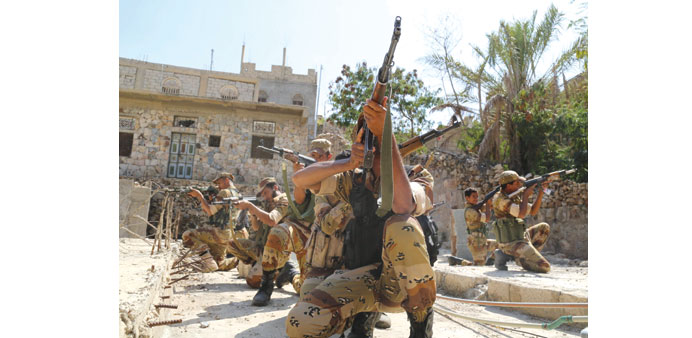Soldiers loyal to Yemen’s government aim their rifles during a training exercise in the southwestern city of Taez yesterday.
AFP
Dubai
Yemeni government and rebel representatives meet in Switzerland tomorrow for UN-brokered peace talks, likely to be accompanied by a ceasefire, aimed at ending a deadly conflict exploited by Islamist militants.
More than a year after Iran-backed Shia Houthi rebels swept into Yemen’s capital Sanaa in the first sparks of civil war, none of the fighting factions has emerged victorious.
Hopes are high that a renewable seven-day ceasefire could begin on the eve of the new round of talks which will be open-ended and held at an undisclosed location.
A truce is much needed in the Arabian Peninsula’s poorest nation where an estimated 80% of the population of 26mn needs aid.
The United Nations says more than 5,800 people have been killed in Yemen, about half of them civilians, and more than 27,000 wounded since March.
Previous UN efforts have failed to narrow differences between the factions, and past ceasefires have failed to hold.
But this time “there is a real chance for a breakthrough”, said Emirati analyst Abdulkhaleq Abdulla, who believes “there will be concessions from both sides”.
“Gulf Arab states have reached a point where they are convinced it is about time a peaceful solution should be given a better chance” to succeed, he said.
Yemen’s conflict has pitted local forces backed by a Saudi-led coalition fighting in support of President Abd-Rabbu Mansour Hadi’s government against the Houthis who have allied with renegade troops still loyal to wealthy ex-president Ali Abdullah Saleh.
The warring sides have agreed to sit at the same table despite mutual mistrust, mainly over UN Security Council Resolution 2216 which calls for rebels to withdraw from key cities and surrender their weapons.
The resolution is a mainstay of the position of the government and its Gulf backers.
“It is difficult to see the Houthis implement this resolution as this would signal an acknowledgement of their defeat,” said London-based analyst Abdelwahab Badrkhan.
According to UN envoy to Yemen Ismail Ould Cheikh Ahmed, talks will focus on four main areas, including the terms of a permanent ceasefire and the withdrawal of armed groups from areas they control.
The government’s proposal for a truce followed last week’s killing of the governor of Aden in a blast claimed by the Islamic State militant group.
In October, IS claimed a series of deadly attacks on government and coalition forces in Aden.
“Alarmed by the growing jihadist threat in territories under its control following the attacks in Aden, the government has no choice but to soften its position and act positively,” said Badrkhan.
Abdulla agrees that IS and Al Qaeda, already well established in Yemen’s south, are “a common enemy that puts pressure on both sides of the Yemeni conflict, as well as Gulf countries”.
“Nobody wants to see Daesh (Arabic acronym for IS) settle in Yemen and create a base as dangerous as that it has established in Syria,” he said.

